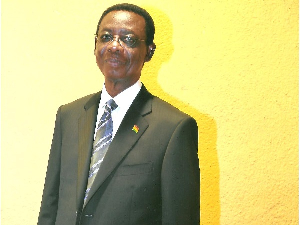In spite of the Electoral Commission's press statement on 15th May 2024, backed by documents, refuting the false and unfounded allegations by the President of Imani to the effect that, the Commission disenfranchised voters in the Guan Constituency (SALL), Franklin Cudjoe has continued to misinform and mislead the public by referring to a public statement issued by the Commission on 6th December 2020. We note also that other citizens, such as Prof. Kwaku Asare, have also made reference to the 6th December 2020 statement issued by the Commission.
As an Election Management Body, we are duty-bound to educate the public on the electoral process as follows:
1. Per Subsection l(c) of Section 5 of the Local Governance Act, 2016 (Act 936) as amended by Act 940, an MP is a member of the District Assembly of the District in which the constituency is located. This provision is consistent with Article 242 (b) of the Constitution which provides that:
"A District Assembly shall consist of ... (b) the Member or Members of Parliament for the Constituencies that fall within the area of authority of the District Assembly as members without right to vote."
2. An MP can therefore not be a member of two District Assemblies. Subsection 6 of Section 7 of Act 936 provides that, "A person shall not at any time be a member of more than one District Assembly." Put differently, two District Assemblies cannot have one MP as a member of their respective assemblies at the same time.
3. The provisions of the Constitution and the Local Governance Act as highlighted above, provide the legal basis for creating a new constituency whenever a new district is created, to avoid a situation where residents of two districts will vote for one MP. If two districts were allowed to vote for one MP, that would violate the law, as the MP so elected would be a member of the two District Assemblies whose voters elect the MP.
4. When the Guan District was created out of the Jasikan District as per Legislative Instrument 2416, by the operation of law, voters in the new Guan District could not vote for an MP in the Buem Constituency of the Jasikan District Assembly. Doing so would have violated Act 936.
5. The Electoral Commission has a constitutional mandate to create constituencies and educate and inform citizens about the specific constituencies in which they are legally allowed to vote.
6. As explained in our previous statement, given that the Legislative Instrument that created the Guan District came into force on 9th November 2020, the same day Parliament went on recess, and with Parliament only returning from recess on 14th December 2020, that is, after the General Elections, the Constitutional Instrument creating the Guan Constituency could not be laid before Parliament, in time for it to mature into law before the Parliamentary Election on 7th December 2020.
7. That situation was not the creation of the Electoral Commission. The Commission did not create the Guan District neither was it consulted when decision was taken to create the Guan District.
8. The Commission did not and does not determine the calendar of Parliament.
9. However, the Commission had the constitutional mandate to inform voters in SALL and the general public that by the operation of law, voters in the Guan District could not vote for an MP in the Buem Constituency which falls under the Jasikan District.
10. The Commission's statement of 6th December 2020 was a constitutional duty which the Commission was bound by law to perform. Had the Commission failed to do so and left residents of the Guan District to vote for an MP in the Jasikan District/ Buem Constituency, the election of the MP for the Buem Constituency would have violated an Act of Parliament, Act 936, as the MP would have illegally become a member of more than one District Assembly, the Guan District Assembly and the Jasikan District Assembly.
11. It is therefore disingenuous for anyone to suggest that, under the circumstances outlined, the Commission in performing its constitutional duty, disenfranchised the good people of SALL/ Guan District.
12. As indicated in our previous statement, it is not in the interest of the Commission to disenfranchise any citizen. The blame does not lie with the Electoral Commission which only performed its constitutional duties following the creation of the Guan District. The discerning public can based on the facts outlined above, ascertain the truth for themselves.
13. The general public is urged once again to ignore the campaign of Franklin Cudjoe to perpetuate the false narrative that the Electoral Commission disenfranchised SALL voters in 2020.
14. To conclude, the Commission quotes paragraph 10 of the response of the Attorney-General to Parliament dated 13th November 2023:
"Mr. Speaker, the SALL problem began in November 2020, when Parliament allowed the Local Government (Guan District Assembly) (Establishment) Instrument, 2020 (L. L 2416) for the creation of the Guan District, which had been laid before Parliament on Tuesday, 6th October 2020, to come into effect. On Monday, ~ November 2020 (less than a month before December 2020 elections), L. l 2416 came into force after having satisfied the constitutional prerequisite of being laid before Parliament for twenty-one sitting days and same had not been annulled by Parliament. It is pertinent to note that the areas carved into the Guan District by L. l 2 4 I 6, were hitherto, part of the Jasikan District. "
Thank you.
AG. DIRECTOR, PUBLIC AFFAIRS
Press Releases of Monday, 20 May 2024
Source: Electoral Commission Ghana
Inability of SALL (Guan Constituency) to vote in the 2020 parliamentary elecrion: Public Education
Entertainment












